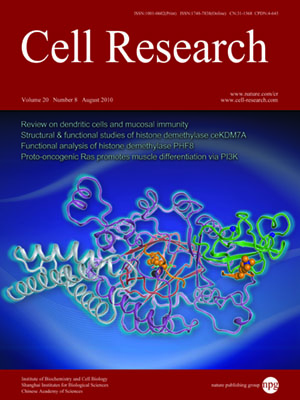
Volume 20, No 8, Aug 2010
ISSN: 1001-0602
EISSN: 1748-7838 2018
impact factor 17.848*
(Clarivate Analytics, 2019)
Volume 20 Issue 8, August 2010: 899-907
ORIGINAL ARTICLES
Coordinated regulation of active and repressive histone methylations by a dual-specificity histone demethylase ceKDM7A from Caenorhabditis elegans
Hanqing Lin1, Yiqin Wang1, Yanru Wang1,2, Feng Tian1, Pu Pu1, Yi Yu1, Hailei Mao1,2, Ying Yang3,4, Ping Wang3,4, Lulu Hu3,4, Yan Lin3,4, Yi Liu3,4, Yanhui Xu3,4 and Charlie Degui Chen1
1State Key Laboratory of Molecular Biology, Shanghai Key Laboratory of Molecular Andrology, Institute of Biochemistry and Cell Biology, Shanghai Institutes for Biological Sciences, Chinese Academy of Sciences, 320 Yueyang Road, Shanghai 200031, China
2Affiliated Hospital of Nantong University, Nantong 226001, China
3School of Life Sciences, Fudan University, 220 Han-Dan Road, Shanghai 200433, China
4Institutes of Biomedical Sciences, Fudan University, 130 Dong-An Road, Shanghai 200032, China
Correspondence: Charlie Degui Chen, Yanhui Xu,(cdchen@sibs.ac.cn; xuyh@fudan.edu.cn)
H3K9me2 and H3K27me2 are important epigenetic marks associated with transcription repression, while H3K4me3 is associated with transcription activation. It has been shown that active and repressive histone methylations distribute in a mutually exclusive manner, but the underlying mechanism was poorly understood. Here we identified ceKDM7A, a PHD (plant homeodomain)- and JmjC domain-containing protein, as a histone demethylase specific for H3K9me2 and H3K27me2. We further demonstrated that the PHD domain of ceKDM7A bound H3K4me3 and H3K4me3 co-localized with ceKDM7A at the genome-wide level. Disruption of the PHD domain binding to H3K4me3 reduced the demethylase activity in vivo, and loss of ceKDM7A reduced the expression of its associated target genes. These results indicate that ceKDM7A is recruited to the promoter to demethylate H3K9me2 and H3K27me2 and activate gene expression through the binding of the PHD domain to H3K4me3. Thus, our study identifies a dual-specificity histone demethylase and provides novel insights into the regulation of histone methylation.
Cell Research (2010) 20:899-907. doi: 10.1038/cr.2010.84; published online 22 June 2010
FULL TEXT | PDF
Browse 2170


